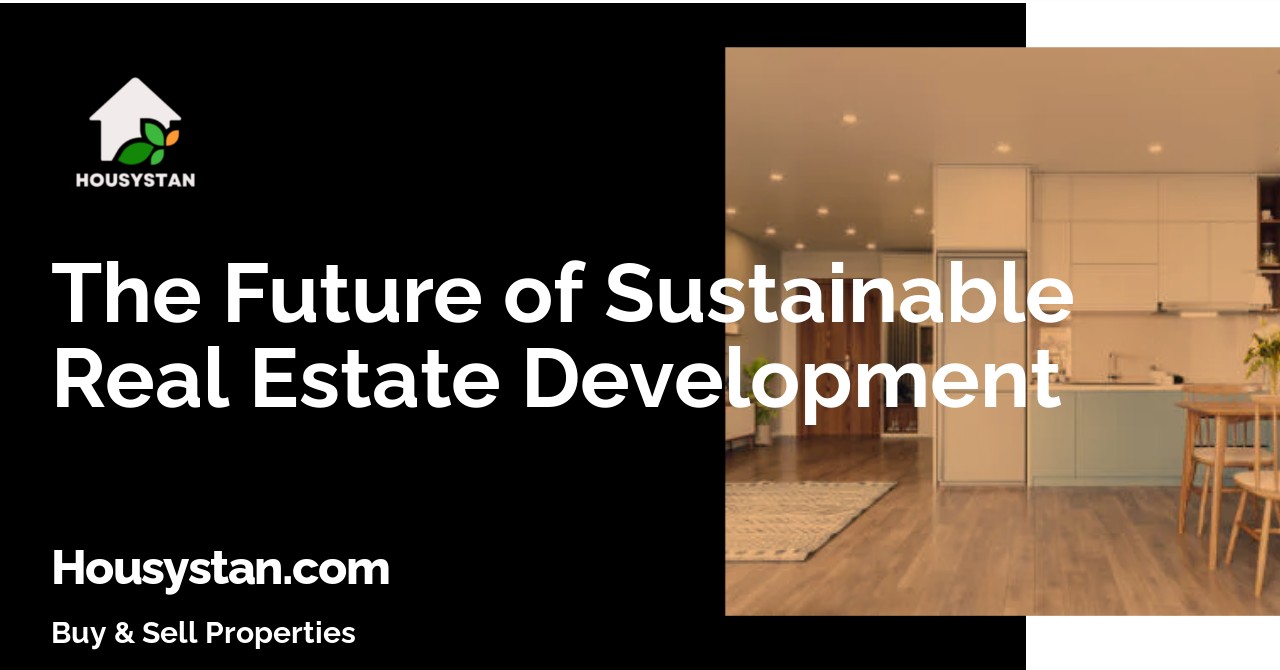The Future of Sustainable Real Estate Development
Read latest blogs and articles from Housystan

The Information mentioned here was last updated on:
21/2/2026The Future of Sustainable Real Estate Development
Introduction: A Paradigm Shift in Real Estate
The real estate sector is undergoing a remarkable transformation as sustainability moves from being a niche concern to an essential component of development strategies. Forward-thinking developers, architects, and investors are embracing eco-friendly building materials, energy-efficient designs, and innovative technologies to create resilient, future-proof communities. The future of sustainable real estate development is not only about reducing environmental impact but also about enhancing quality of life, improving economic returns, and responding to evolving societal expectations.
- Verified Tenants/Buyers
- Unlimited Property Listing
- Zero subscription/charges fee
Drivers of Sustainable Real Estate Development
Sustainable real estate development is being propelled by a confluence of regulatory, environmental, and market forces. With governments worldwide enacting stricter building codes and climate policies, developers are increasingly incentivized—or required—to adopt greener practices. Simultaneously, heightened public awareness of climate change and resource depletion is influencing buyer preferences, with many homebuyers and tenants actively seeking out properties that deliver long-term environmental and financial benefits. Financial institutions are also joining the push, offering green financing and rewarding sustainable projects with better lending terms.
Green Building Materials: The Foundation of Eco-Friendly Construction
One of the core trends shaping sustainable real estate is the use of green building materials. Developers are moving away from traditional, resource-intensive options and towards renewable or recycled alternatives. Bamboo, reclaimed wood, recycled steel, and low-carbon concrete are becoming mainstays in modern construction. These materials not only minimize the ecological footprint of new developments but often provide superior thermal performance, durability, and aesthetic appeal. The adoption of such materials is also a crucial step towards achieving certifications such as LEED (Leadership in Energy and Environmental Design) and BREEAM (Building Research Establishment Environmental Assessment Method), which are becoming industry standards.
Energy Efficiency and Smart Technologies
Energy consumption in buildings accounts for a significant share of global greenhouse gas emissions. As a result, energy efficiency is at the heart of sustainable real estate development. Developers are integrating advanced insulation, triple-glazed windows, and high-efficiency HVAC systems to reduce operational costs and carbon footprints. Smart technologies, such as automated lighting, energy management systems, and smart thermostats, empower occupants to monitor and control their energy usage in real time. These innovations not only conserve resources but also contribute to healthier, more comfortable living and working environments.
Renewable Energy Integration
The future of real estate is inexorably linked to renewable energy. Solar panels, wind turbines, and geothermal systems are being incorporated into new developments, enabling properties to generate their own clean power. Some projects are even achieving net-zero or energy-positive status, producing more energy than they consume. Microgrids and distributed energy systems are gaining traction, allowing communities to share resources and increase resilience against power outages. These advancements not only reduce utility costs for occupants but also contribute to national and global decarbonization goals.
Water Conservation and Management Strategies
Water scarcity is an escalating challenge in many regions, prompting developers to prioritize water-efficient design and technology. Rainwater harvesting systems, greywater recycling, and drought-resistant landscaping are becoming standard features in sustainable developments. Advanced plumbing fixtures, such as low-flow toilets and sensor-activated faucets, further minimize water consumption without sacrificing comfort or functionality. These measures not only conserve a precious resource but also reduce long-term operating costs and enhance property values.
Urban Planning for Sustainable Communities
Beyond individual buildings, sustainable real estate development encompasses holistic urban planning. Mixed-use developments, transit-oriented design, and walkable neighborhoods are fostering vibrant, resilient communities that minimize reliance on automobiles and encourage active lifestyles. Green spaces, community gardens, and rooftop parks provide essential ecosystem services, improve air quality, and offer recreational opportunities. By prioritizing accessibility, connectivity, and inclusivity, developers are creating urban environments where people and nature can thrive in harmony.
Adaptive Reuse and Circular Economy Principles
Another key trend shaping the future of sustainable real estate is the adaptive reuse of existing structures. Rather than demolishing old buildings, developers are repurposing warehouses, factories, and historic landmarks into residential, commercial, or mixed-use spaces. This approach preserves cultural heritage, reduces construction waste, and significantly lowers the embodied carbon of new developments. Circular economy principles—such as designing for disassembly and material recovery—are also gaining traction, ensuring that today's buildings can be efficiently repurposed or recycled in the future.
The Role of Digital Innovation in Sustainable Real Estate
Digital technology is revolutionizing the real estate sector. Building Information Modeling (BIM) enables more accurate design, construction, and maintenance, minimizing errors and resource waste. Digital twins—virtual replicas of physical assets—allow developers to simulate and optimize building performance before construction even begins. Blockchain technology is enhancing transparency and traceability in supply chains, ensuring that sustainable sourcing claims can be verified. These advances are not only making sustainability more achievable but also delivering value in terms of cost savings, risk reduction, and stakeholder trust.
Challenges and Opportunities Ahead
While the momentum behind sustainable real estate development is undeniable, significant challenges remain. Upfront costs, regulatory complexity, and the need for industry-wide collaboration can pose barriers to adoption. However, the long-term benefits—lower operating expenses, increased property values, enhanced tenant satisfaction, and reduced environmental impact—are driving widespread change. As technology evolves and awareness grows, the sector is poised to overcome these obstacles and deliver transformative, scalable solutions.
Conclusion: Building a Greener Tomorrow
The future of sustainable real estate development is bright, guided by innovation, collaboration, and a shared commitment to environmental stewardship. As developers, investors, and communities continue to embrace green building practices, the built environment will play a pivotal role in addressing climate change, conserving resources, and enhancing urban resilience. By making sustainability the cornerstone of real estate, we can build healthier, smarter, and more equitable spaces for generations to come—proving that what’s good for the planet is also good for business and society.